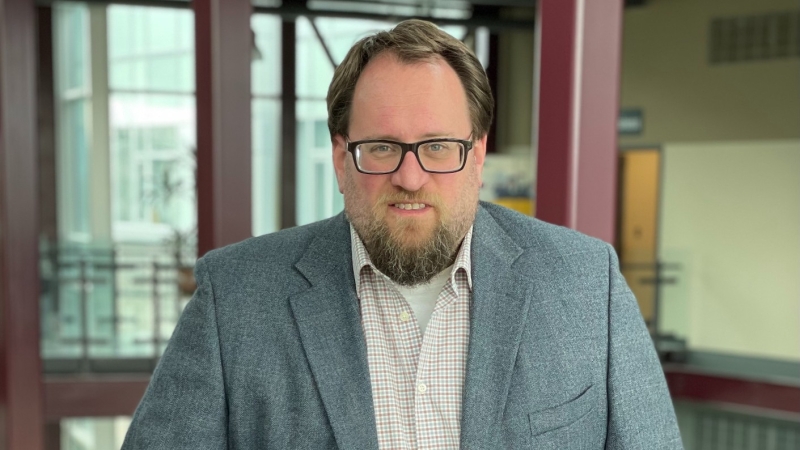Excellence in educating future educators
School of Education Lecturer Glen Thielmann has earned plaudits for how he engages all learners, gives students the chance to take their lead in their learning and his in-depth knowledge of course content. Recently he received the Teacher Educator award from the Association of BC Deans of Education for his work with UNBC and School District 57.

Glen Thielmann feels energized working with teacher candidates in UNBC’s School of Education. The feeling is mutual.
Recently, Thielmann received the 2022 Association of BC Deans of Education Teacher Educator Award. According to students who participated in the nomination process, Thielmann is the kind of instructor who “makes us feel excited about learning new methods and reminds us about critical thinking and to think about our learning intentions.”
Thielmann joined the School of Education in 2020 as a lecturer after more than two decades as a high school teacher in Prince George and says he gets genuine energy working with his students, both in the secondary and post-secondary environments.
“I interact with teacher candidates in much the same way that I did with high school students in that I am curious about their life stories and try to give each one some space to grow,” he says. “I often miss teaching secondary Social Studies, but I am loving working with adult learners, even if only for the more sophisticated humour and the opportunity for deep dives into theory.”
The Teacher Educator Award is given out annually to someone at the school or university level who has distinguished themselves in collaborating with a teacher education program in B.C. Thielmann earned plaudits for how he engages all learners, gives students the chance to take their lead in their learning and his in-depth knowledge of course content.
But Thielmann thinks of it as more of a team award. He credits his colleagues for all the work everyone put in during the recent renewal of the Bachelor of Education program.
“Each of us has had an important part to play,” Thielmann says. “I've put my energy into building connections to local and regional educational communities, especially School District 57, and also into co-designing a variety of place-responsive learning activities for each of the courses I've taught or co-taught, as well as whole-program experiential activities.”
This is the third consecutive year someone associated with the UNBC School of Education has won the award. In 2021, Debbie Kaban from School District 57 was one of three recipients. She was recognized for her efforts in helping to shape UNBC’s new Bachelor of Education (BEd) curriculum. In 2020, Dr. Deborah Koehn received the award for her work in creating exceptional learning environments for teacher candidates.
In addition to his role with the School of Education, Thielmann is a PhD candidate in Natural Resources and Environmental Studies and continues to work with School District 57 as Professional Development Fund Administrator and Pro-D Chair on the Prince George District Teachers' Association executive.
At UNBC, Thielmann integrates the School of Education’s signature pedagogy of People, Place, and Land in his courses.
“For me, and hopefully my students, this is about elevating the role in education for human connection, language, and culture,” he says. “This focus values how the spaces we inhabit as educators are made into special places for ourselves and our students while respecting differences, and acknowledging how our learning and sense of belonging is rooted in the lands we live on and the places that define our journeys.”
Thielmann taught Geography, Social Studies, and English during his time as a high school teacher and is now working to decolonize the courses he teaches at the post-secondary level. He does this by introducing teacher candidates to different perspectives and incorporating local knowledge, stories and history into his instruction.
“Fellow faculty and our teacher candidates are finding new roles for learning about Indigenous ways of knowing as we build experiential and place-responsive activities into our instructional design, and invite knowledge keepers and elders to share with us,” says. “I feel confident with the land-based aspects of this work, but I am a novice at the Indigenization aspect.”
